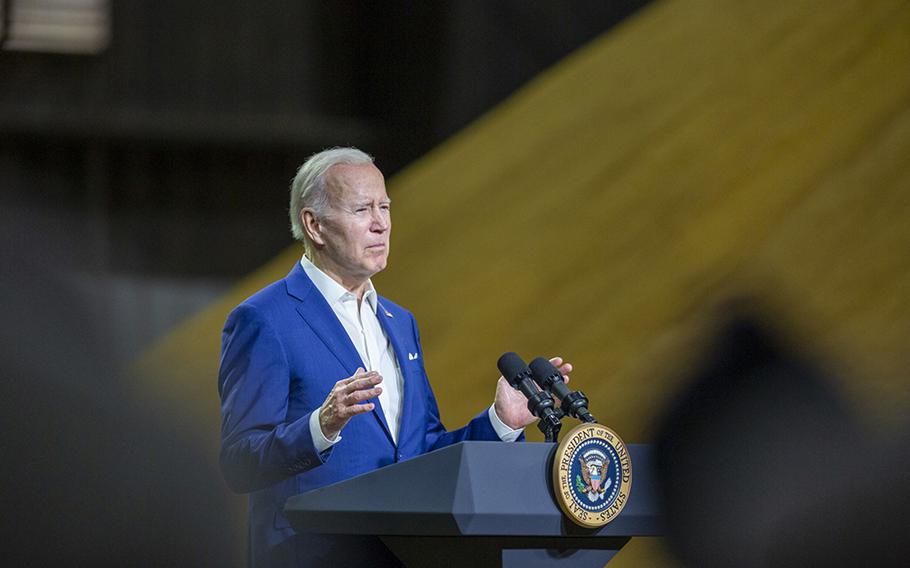
President Joe Biden speaks in Menlo, Iowa, U.S., on Tuesday, April 12, 2022. (Rachel Mummey/Bloomberg)
“Our long national nightmare is over.”
President Gerald R. Ford followed up his August 1974 inaugural address with a Presidential Proclamation on Sept. 8, 1974, granting former President Richard M. Nixon a “full, free and absolute pardon,” precluding indictment or prosecution for crimes committed while he was in office.
Nixon resigned in the face of certain impeachment and conviction for crimes summarized under the shorthand label “Watergate.”
This and other recent history are highly germane to the growing legal problems of former President Donald Trump and now-threatened impeachment of President Joe Biden.
Ford remains our only chief executive who was elected to neither the presidency nor the vice presidency. He was selected by Nixon when Vice President Spiro Agnew was forced to resign because of corruption.
Ford paid a high price in unpopularity. This decision was probably decisive in his narrow election loss to Jimmy Carter in 1976.
Trump was impeached twice by the House of Representatives while serving in the White House. However, the Senate in the first trial voted to acquit and in the second failed to reach the two-thirds majority required for conviction.
President Bill Clinton, a Democrat, was impeached in the House and tried in the Senate during January-February 1999. Again, however, the Senate failed to provide the two-thirds vote for conviction. Note that his approval ratings in opinion polls went up, not down, during this time.
Republican House Speaker Kevin McCarthy recently stated publicly, seemingly casually, that President Joe Biden “probably” will be impeached.
An extreme action once shunned by our congressional representatives has now apparently because almost routine, certainly discussed openly.
How and why has this happened?
The only previous House impeachment was of President Andrew Johnson in 1868. This occurred after our catastrophically costly Civil War. The war was followed by many years of bitterness and violence. Intense partisan and regional hatreds, poisonous acrimony and sporadic incidents of criminal violence including by the newly-formed Ku Klux Klan defined those years.
John F. Kennedy’s book “Profiles in Courage” provides important information and insights. Each chapter is devoted to a U.S. senator who demonstrated exceptional courage during a major political crisis.
The book, published in 1957, was part of the comprehensive, carefully planned Kennedy campaign for the White House. Candidates regularly produce campaign biographies and other rushed books that do not long survive. Kennedy and aide, close confidante and alter ego Theodore Sorensen produced serious history of lasting value.
Chapter VI, titled “I looked down into my open grave …” describes the actions of Republican Sen. Edmund G. Ross of Kansas in the Senate trial of Johnson.
Johnson, President Abraham Lincoln’s 1864 running mate, was a pro-Union Democrat, from Confederate state Tennessee, though also a supporter of slavery.
Johnson in the White House was inept, tactless, self-destructive. Removing him would facilitate savage Radical Republican reprisals against the South that Lincoln had deflected.
Ross held the 36th vote essential to convict Johnson. Despite extreme political and personal threats, he refused to commit himself and, in the end, voted “Not guilty.”
Ross knew that to convict would destroy our executive’s authority. His Senate career ended. He and his family were shunned, vilified, physically attacked.
The Civil War was our costliest war, with approximately 600,000 dead, vast physical destruction, and lingering destructive legacies.
One important distinction of our nation is military loyalty. When our nation divided during our Civil War, Union troops remained loyal when Lincoln removed Gen. George McClellan for insubordination.
A similar example is President Harry S. Truman’s removal of Gen. Douglas MacArthur during the Korean War,
Our partisan rigidities and righteousness today reflect relative security.
If we continue, we may ultimately destroy ourselves.
Arthur I. Cyr is author of “After the Cold War.”